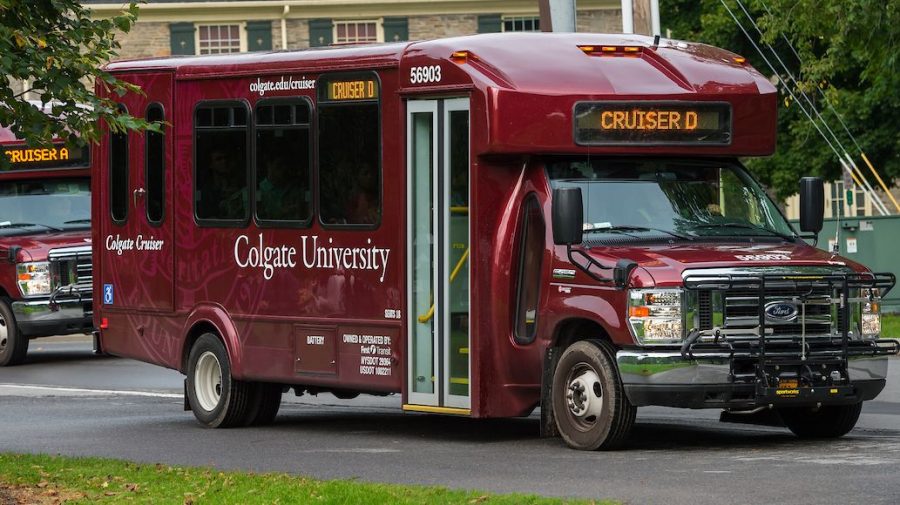University Overhauls Cruiser System
This semester, Colgate University implemented several updates to the Cruiser system, aiming to adequately respond to feedback from the student body, as well as design long-term strategies for safe and effective public transportation in a post-pandemic world. Updates include new routes, stops and extended hours to certain locations.
The Colgate Cruiser is contracted out and operated entirely by First Transit Inc., the third-largest public transportation firm in the United States. Director of Purchasing Simon Fritz outlined that there are new priorities that defined the changes to the Cruiser system relating to efficiency, service expansion and frequency.
With new off-campus residential options, Fritz noted the importance of easing the ability of students to get to and from campus quickly.
“[We need to] address the primary need to transport students from three primary off-site residential areas: Townhouses, Apartments, and Wendt University Inn to the main academic quad (via O’Connor Student Center and Frank Dining hall) during ‘rush hours,’” according to Fritz.
The Wendt University Inn, a new housing option, is located on Route 12B beyond the Village of Hamilton. It is located 1.6 miles from Lathrop Hall. Estimates from both Google Maps and Apple Maps suggest that to walk from the Wendt University Inn to the Academic Quad would take approximately 36 minutes.
The new routes now extend from the Wendt University Inn to Good Nature Brewing Company, located just before the Townhouses on the opposite end of Route 12B.
The second priority outlined by the Purchasing Department was to “increase the frequency of Cruiser runs from every thirty minutes to every 20 (or 10) minutes during ‘rush hour’, says Fritz.
Each stop within that route will now operate on a 20-minute cycle. The Cruiser system will also return to service in its late-night rotation this academic year.
“Based on student feedback, late-night service can be handled on an “on-demand” model, in which a Cruiser is strategically positioned at either Benton Hall parking lot, Frank Dining [Hall] turnaround, Case-Geyer Library and the Colgate Bookstore to immediately depart on a 20-minute loop cycle when passengers arrive requesting transport,” says Fritz.
Cruiser System Dispatcher Courtney Orvis explained that the Wendt’s transition from quarantine housing to fully residential housing has warranted the addition of new cruiser stops at this location, with the shopping, bookstore and apartment routes now including the Wendt in their list of stops.
“We’re trying to make these students feel as included as anyone living on campus so that they’re able to catch a ride and get to the places they need to get to without having to use their bicycles or cars all the time,” Orvis said.
Orvis also explained that the Townhouse and Shopping lines now service the Good Nature Farm Brewery, starting at 8 p.m. This change came as a result of the student body requesting easier access to the Brewery, which serves as a popular dining and social location for student life.
Further, the Cruiser route loops have been significantly condensed in terms of turnaround time, with the majority of cruisers now completing 20-minute loops through each route. This is a substantial improvement over previous semesters, wherein turnaround times averaged 35 minutes within each loop, according to Orvis.
In addition, the Townhouse routes have been newly staggered, allowing a Cruiser to service the townhouses every 10 minutes to better address student demand, a sizable improvement over the 20-minute wait time in previous semesters.
Junior Zoe O’Bryan, a current resident of the Colgate Townhouses, explained that this is the first semester in which she consistently relies on the Cruiser system to get to class, as she lived much closer to the Academic Quad during his first two years at Colgate. While the new stops at the Wendt University Inn and Good Nature Brewery minimally impact O’Bryan, she acknowledged that the Cruiser capacity at the Townhouses seems to be sufficiently meeting demand. With that said, she expressed relative frustration with the Cruiser’s sporadic inconsistency and the lack of information pertaining to when a specific Cruiser route is not currently running.
“The cruiser system is definitely beneficial to those who live in the [townhouses]. However, it could definitely be more reliable, as sometimes one of them is not running and it is not communicated well to community members,” O’Bryan said.
Students, faculty and staff can check for cruiser routes and location updates on the live cruiser app TransLoc, available on mobile devices and through the Colgate University mobile app.
Wynter Schnell is a junior from Pound Ridge, New York concentrating in political science with a minor in anthropology. He’s served as a news reporter...










